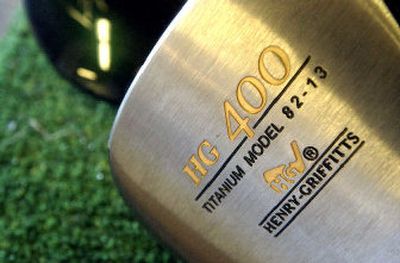A golfer’s dream

A Hayden firm has a nationwide reach, then leaps the Atlantic and Pacific for even more business.
From its unobtrusive two-story gray building an eighth of a mile north of Prairie off Highway 95, the Henry-Griffitts Co. has 225 outlets in the U.S. and Canada and another 60 in Europe. Furthermore, its down-under subsidiary, Henry-Griffitts of Australia, covers much of Asia.
Its product is every golfer’s dream: clubs made expressly for the individual, taking into account his or her swing, stance and ability.
Randy Henry and Jim Griffitts, both local golf professionals, founded the firm in 1983. Griffitts died in 1993, but Henry continues with the 30-member firm, improving equipment and leading its teachers’ training program.
According to Chief Executive Officer Jim Hofmeister, golfers at every level, from beginners to scratch players, form the firm’s customer base.
“Poorly fitted equipment makes it hard for golfers to make a strong, balanced swing motion,” he says. “When you try to make an in-balance swing with an ill-fitted club, you tend to compensate by experimenting with out-of-balance motions, and that causes you to fall backward or sway.”
And it’s a myth, he says, that golfers should be fairly decent players before they’re fitted for custom clubs.
“In fact,” according to Hofmeister, “mid- to high-handicappers benefit more than golfers with single-digit handicaps. The improved swing shows up immediately on the less experienced player.”
He says every major golf equipment manufacturer has a fitting system, but Henry-Griffitts is the only firm that uses teachers as fitters.
The locally built clubs, he says, have scored more than 30 wins on five major tours but, unlike major equipment manufacturers, Henry-Griffitts doesn’t pay professional golfers to use them and thus doesn’t garner the publicity that makers such as Nike does through contracted players like Tiger Woods.
The company doesn’t sell its clubs through retail outlets, but through more than 500 golf pros trained by Henry-Griffitts. Those teachers assess a golfer’s stance, swing style and the flight of balls struck by the client.
One local fitter is Patti Marquis, PGA head professional at The Links Golf Course near Post Falls.
All teachers certified by Henry-Griffitts as fitters must have completed a minimum of 10 days’ training by the firm, but since Marquis is so close to its headquarters, she’s taken far more instruction in club-fitting than most.
She describes the program as all-inclusive, from teaching and fitting to selling and marketing.
On a sunny day at The Links, Marquis and Henry team up to fit clubs to a high-handicap golfer.
Henry explains that, on the driving range, “a student can see for himself what more loft can do, what a longer shaft can do. It’s a simple concept.”
On the cart provided by Henry-Griffitts to Marquis and every other teacher certified by the firm is an array of screw-on iron and wood clubheads, plus steel and graphite shafts of different lengths and characteristics.
Henry explains that the parts on the cart represent a possible 4,500 different combinations, enabling Marquis to mix and match club specs on the fitting tee to suit each player.
The session begins with the prospective customer using his own clubs while Marquis and Henry observe his swing and ball flight.
They then begin assembling different clubhead/shaft combinations, as the client strikes balls from a piece of plastic called a “lie board.” Marquis and Henry mark the clubhead sole and face with tape to determine where the clubhead strikes the board and the ball.
The 90-minute process yields readings that indicate for the individual the best angle of the shaft with the sole, the correct shaft flex, clubhead loft, head design and weight. It is, in fact, a blueprint for a custom-fit set of clubs that, say Marquis and Henry, will strengthen the client’s swing.
Marquis sends the results of the fitting to the company headquarters by computer where Grant Hobson, the firm’s customer service and production manager, oversees the assembly of the custom-fit clubs.
“You don’t have to buy a complete set all at once,” Hobson says, explaining that a typical first-time buyer may purchase a driver and one or two fairway woods and perhaps a half-set of irons, the rest to be filled in later.
According to Hofmeister, irons cost from $110 to $162, fairway woods from $245 to $360 and drivers from $375 to $445. The variation in prices is due to the composition of the components.
In Hobson’s inventory are 90 graphite and steel shafts, 40 cast iron heads, 28 wood combinations and titanium driver heads. The shafts are all U.S.-made, the steels from the True Temper Co. and the graphites from Grafalloy. The iron heads are cast in China.
Prior to assembling a club, Henry-Griffitts employees weigh and measure all components and test the vibration frequency of each shaft.
Hobson says orders he receives by noon are shipped to the teacher who ordered them the following day, and repairs are shipped within two days.
Clients are encouraged to return to their teachers as soon as possible to assess their swing with the new clubs, and the firm gives a 100-day warranty on each.
In addition to The Links, Henry-Griffitts-certified teachers are at the following Kootenai County golf courses: Coeur d’Alene Public, Avondale, Hayden Lake Country Club, the Coeur d’Alene Resort, the Club at Black Rock and Prairie Falls.